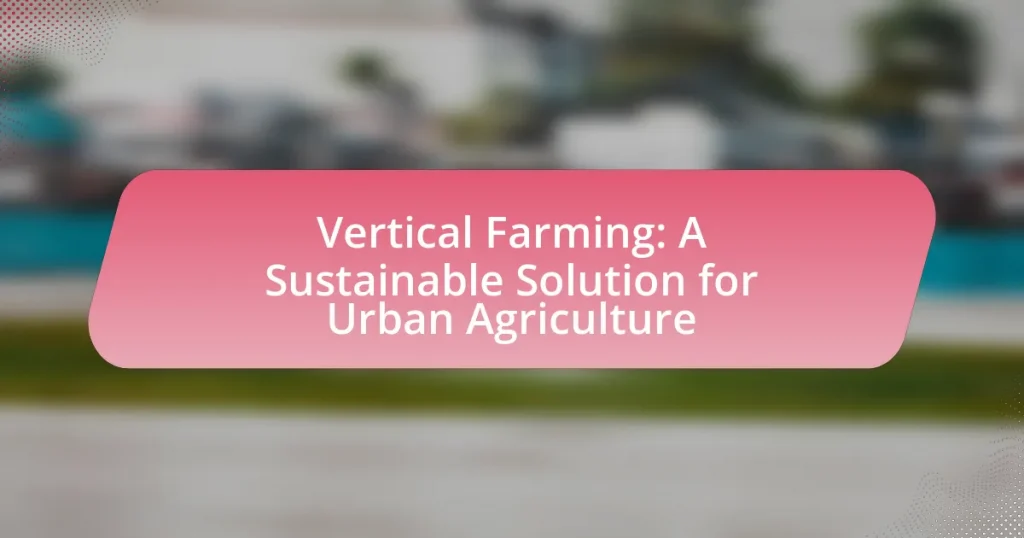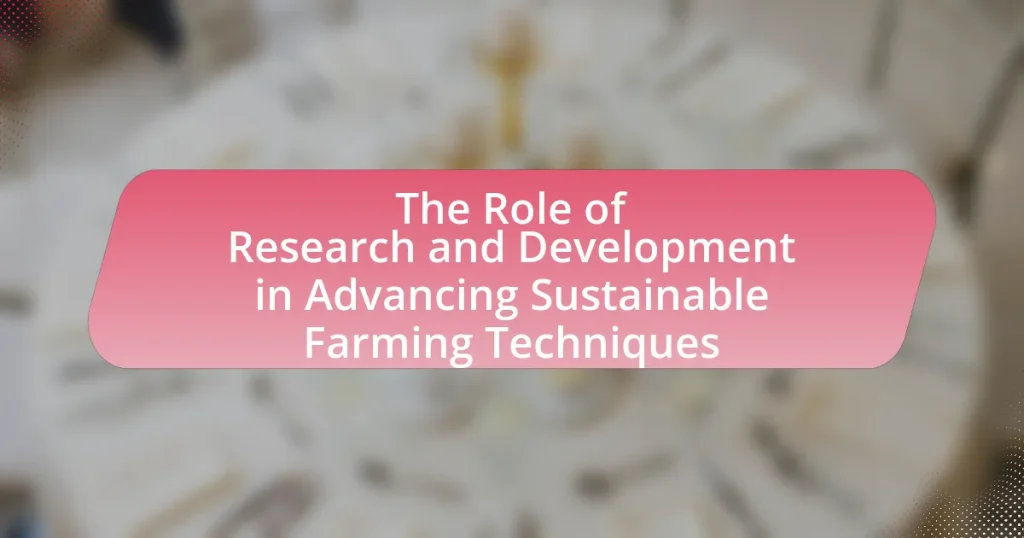Agri-Tech startups are innovative companies that utilize technology to enhance agricultural practices, improve productivity, and tackle challenges within the farming sector. This article explores the significance of Agri-Tech startups, highlighting their contributions to sustainable food production, efficiency through precision agriculture, and climate change mitigation. It examines the technologies commonly employed by these startups, emerging trends in the sector, and the impact of consumer preferences on innovation. Additionally, insights from recent conferences reveal key themes such as sustainability and digital transformation, while discussing the challenges and opportunities that shape the future of Agri-Tech startups.
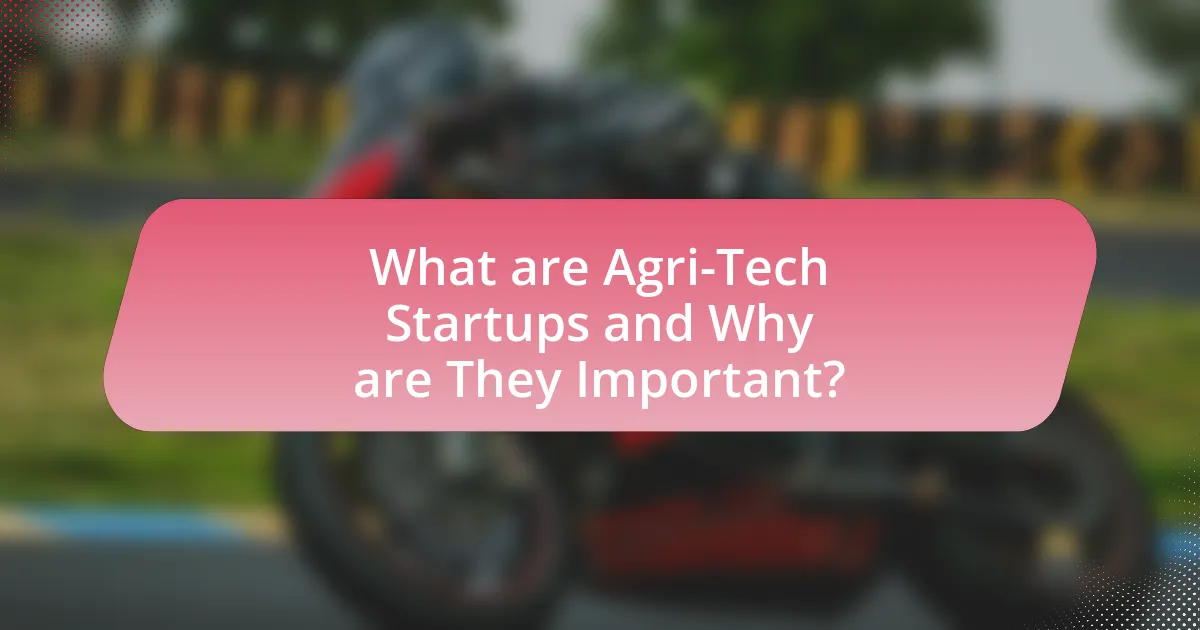
What are Agri-Tech Startups and Why are They Important?
Agri-Tech startups are innovative companies that leverage technology to improve agricultural practices, enhance productivity, and address challenges in the farming sector. These startups are important because they contribute to sustainable food production, increase efficiency through precision agriculture, and help mitigate the impacts of climate change on farming. For instance, according to a report by the Food and Agriculture Organization, adopting advanced technologies in agriculture can increase crop yields by up to 30%, demonstrating the significant potential of Agri-Tech solutions in meeting global food demands.
How do Agri-Tech Startups contribute to modern agriculture?
Agri-Tech startups significantly enhance modern agriculture by introducing innovative technologies that improve efficiency, productivity, and sustainability. These startups develop solutions such as precision farming tools, which utilize data analytics and IoT devices to optimize resource use, leading to reduced waste and increased crop yields. For instance, a report by McKinsey & Company highlights that precision agriculture can increase crop yields by up to 20% while minimizing inputs like water and fertilizers. Additionally, Agri-Tech startups are pioneering advancements in biotechnology, enabling the development of resilient crop varieties that can withstand climate change impacts. This integration of technology not only boosts agricultural output but also supports environmental sustainability, making modern agriculture more resilient and efficient.
What technologies are commonly used by Agri-Tech Startups?
Agri-Tech startups commonly use technologies such as precision agriculture, IoT (Internet of Things), artificial intelligence (AI), drones, and blockchain. Precision agriculture utilizes data analytics to optimize farming practices, enhancing crop yields and resource efficiency. IoT devices collect real-time data from fields, enabling farmers to monitor conditions and make informed decisions. AI algorithms analyze large datasets to predict trends and improve operational efficiency. Drones are employed for aerial imaging and crop monitoring, providing insights that traditional methods cannot. Blockchain technology ensures transparency and traceability in the supply chain, enhancing food safety and trust among consumers. These technologies collectively drive innovation and efficiency in the agricultural sector.
How do these technologies improve agricultural practices?
Technologies improve agricultural practices by enhancing efficiency, increasing yields, and promoting sustainability. Precision agriculture technologies, such as GPS-guided equipment and drones, allow farmers to monitor crop health and optimize resource use, leading to a reported 10-20% increase in crop yields according to the Food and Agriculture Organization. Additionally, data analytics and IoT devices enable real-time decision-making, reducing water usage by up to 30% and minimizing chemical inputs, which supports environmentally friendly farming practices. These advancements collectively contribute to more productive and sustainable agricultural systems.
What trends are emerging in the Agri-Tech startup landscape?
Emerging trends in the Agri-Tech startup landscape include the integration of artificial intelligence for precision farming, the adoption of sustainable practices, and the development of innovative supply chain solutions. Artificial intelligence is increasingly utilized to analyze data for optimizing crop yields and resource management, with startups like CropX leveraging soil data to enhance irrigation efficiency. Sustainable practices are gaining traction as consumers demand eco-friendly products, prompting startups such as Plenty to focus on vertical farming techniques that reduce land use and water consumption. Additionally, innovative supply chain solutions are being developed to enhance food traceability and reduce waste, exemplified by companies like Full Harvest, which connects surplus produce with buyers. These trends reflect a shift towards technology-driven, sustainable agriculture that addresses both productivity and environmental concerns.
What role does sustainability play in these trends?
Sustainability is a central theme in the rise of agri-tech startups, driving innovation and investment in the sector. These startups focus on developing technologies that enhance agricultural efficiency while minimizing environmental impact, such as precision farming tools that reduce resource waste. For instance, a report by the Food and Agriculture Organization highlights that sustainable practices can increase crop yields by up to 30% while conserving water and soil health. This alignment with sustainability not only meets consumer demand for eco-friendly products but also addresses regulatory pressures for sustainable practices in agriculture.
How are consumer preferences influencing Agri-Tech innovations?
Consumer preferences are significantly influencing Agri-Tech innovations by driving the demand for sustainable and efficient agricultural practices. As consumers increasingly prioritize organic, locally sourced, and environmentally friendly products, Agri-Tech startups are innovating to meet these expectations. For instance, a report from the Food and Agriculture Organization indicates that 60% of consumers are willing to pay more for sustainably produced food, prompting Agri-Tech companies to develop technologies such as precision farming and vertical agriculture that reduce resource use and enhance crop yields. This shift in consumer behavior is not only shaping product offerings but also encouraging investment in technologies that align with these values, thereby accelerating the growth of the Agri-Tech sector.
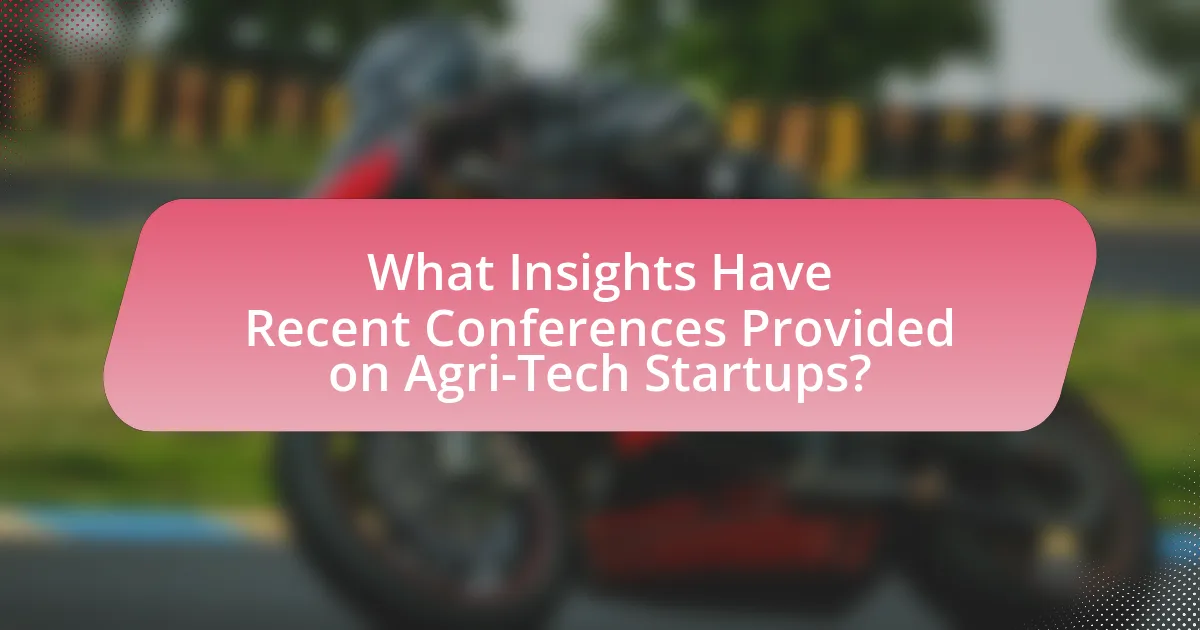
What Insights Have Recent Conferences Provided on Agri-Tech Startups?
Recent conferences have highlighted the increasing focus on sustainability and innovation within agri-tech startups. These events showcased advancements in precision agriculture, such as the use of AI and IoT technologies to optimize crop yields and resource management. For instance, the Agri-Tech East conference in 2023 reported that startups leveraging data analytics have improved farming efficiency by up to 30%. Additionally, discussions emphasized the importance of collaboration between startups and established agricultural firms to drive technological adoption and market penetration.
What key themes were discussed at recent Agri-Tech conferences?
Key themes discussed at recent Agri-Tech conferences include sustainability, precision agriculture, and digital transformation in farming. Sustainability focuses on environmentally friendly practices and reducing carbon footprints, as highlighted by various speakers emphasizing the need for eco-friendly innovations. Precision agriculture involves the use of technology to optimize crop yields and resource use, with discussions around data analytics and IoT applications. Digital transformation addresses the integration of advanced technologies like AI and blockchain to enhance supply chain transparency and efficiency, reflecting the industry’s shift towards more tech-driven solutions.
How are industry leaders defining the future of Agri-Tech?
Industry leaders are defining the future of Agri-Tech through the integration of advanced technologies such as artificial intelligence, precision agriculture, and sustainable practices. These technologies are being utilized to enhance crop yields, optimize resource use, and reduce environmental impact. For instance, a report by McKinsey & Company highlights that AI-driven analytics can increase agricultural productivity by up to 30%, demonstrating the significant potential of these innovations. Furthermore, leaders emphasize the importance of collaboration between tech companies and traditional agricultural stakeholders to drive innovation and scalability in Agri-Tech solutions.
What challenges were highlighted by speakers at these events?
Speakers at the recent conferences highlighted several challenges faced by agri-tech startups, including access to funding, regulatory hurdles, and the need for technological integration in traditional farming practices. Access to funding remains a significant barrier, as many startups struggle to secure investment necessary for scaling their innovations. Regulatory hurdles complicate the introduction of new technologies, often delaying product launches and increasing costs. Additionally, integrating advanced technologies into established farming practices poses challenges, as many farmers are hesitant to adopt new methods without clear evidence of benefits. These challenges collectively hinder the growth and adoption of agri-tech solutions in the agricultural sector.
How are networking opportunities shaping the Agri-Tech ecosystem?
Networking opportunities are significantly shaping the Agri-Tech ecosystem by facilitating collaboration among startups, investors, and industry experts. These interactions lead to the sharing of innovative ideas, access to funding, and the establishment of strategic partnerships. For instance, events like the Agri-Tech Innovation Summit have reported that 70% of attendees found potential collaborators, which directly contributes to the acceleration of technology adoption in agriculture. Furthermore, networking fosters knowledge exchange, enabling startups to learn from established players, thereby enhancing their competitive edge and driving growth within the sector.
What partnerships are emerging from these conferences?
Emerging partnerships from recent agri-tech conferences include collaborations between technology firms and agricultural producers aimed at enhancing crop yield through data analytics and precision farming. For instance, partnerships like that of a leading agri-tech startup with a major agricultural cooperative have been established to integrate IoT devices for real-time monitoring of soil health. These collaborations are supported by the increasing demand for sustainable farming practices, as evidenced by a report from the Food and Agriculture Organization indicating that precision agriculture can increase productivity by up to 20%.
How do these collaborations impact startup growth?
Collaborations significantly enhance startup growth by providing access to resources, expertise, and networks that would otherwise be unavailable. For instance, partnerships with established companies can offer agri-tech startups critical funding, mentorship, and market insights, which are essential for scaling operations. According to a report by the World Economic Forum, startups that engage in collaborations are 50% more likely to achieve rapid growth compared to those that operate independently. This statistic underscores the importance of strategic alliances in accelerating innovation and market penetration within the agri-tech sector.
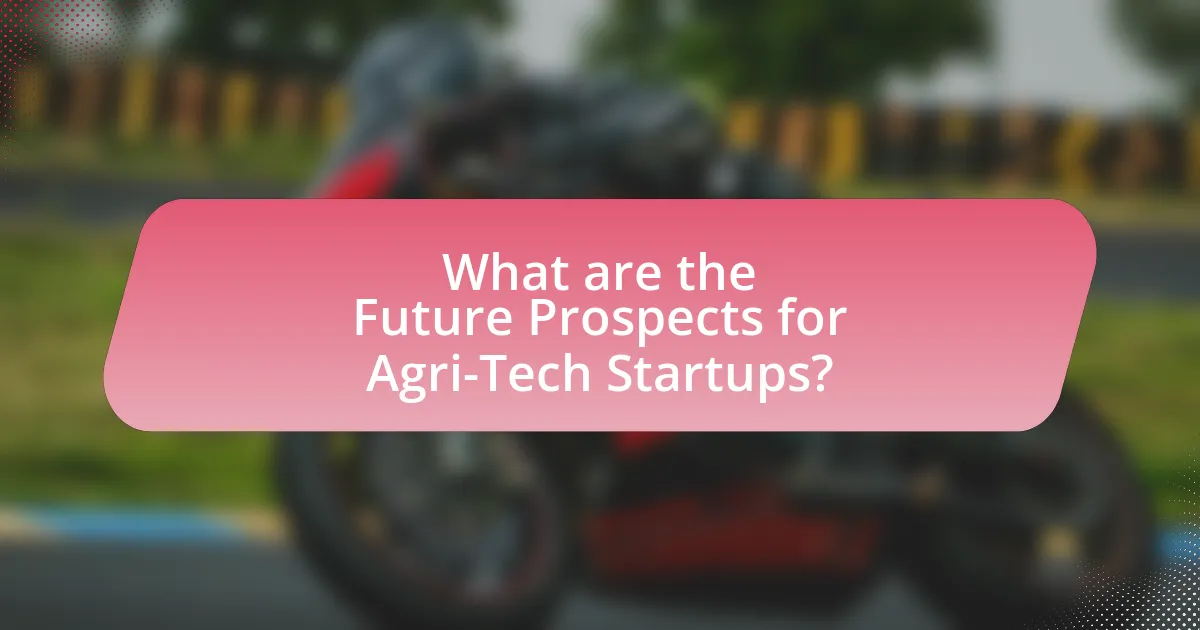
What are the Future Prospects for Agri-Tech Startups?
The future prospects for agri-tech startups are highly promising, driven by increasing global food demand and advancements in technology. The global agri-tech market is projected to reach $22.5 billion by 2025, growing at a CAGR of 12.2% from 2020, according to a report by MarketsandMarkets. This growth is fueled by innovations in precision agriculture, biotechnology, and sustainable farming practices, which enhance productivity and reduce environmental impact. Additionally, the rise of digital platforms and data analytics in agriculture is enabling startups to offer tailored solutions that improve efficiency and yield, further solidifying their role in the agricultural sector.
What innovations can we expect in the Agri-Tech sector?
Innovations in the Agri-Tech sector include advancements in precision agriculture, biotechnology, and automation technologies. Precision agriculture utilizes data analytics and IoT devices to optimize crop yields and resource usage, with studies showing that it can increase productivity by up to 20%. Biotechnology innovations focus on developing genetically modified organisms (GMOs) that are resistant to pests and diseases, enhancing food security. Automation technologies, such as autonomous tractors and drones, streamline farming operations, reducing labor costs and improving efficiency. These innovations are driven by the need for sustainable practices and increased food production to meet global demands.
How will advancements in AI and data analytics influence Agri-Tech?
Advancements in AI and data analytics will significantly enhance Agri-Tech by improving crop yields, optimizing resource use, and enabling precision farming. For instance, AI algorithms can analyze vast datasets from sensors and satellite imagery to provide actionable insights on soil health, moisture levels, and pest infestations, leading to more informed decision-making. According to a report by MarketsandMarkets, the global precision farming market is projected to grow from $7 billion in 2020 to $12 billion by 2025, driven by these technological advancements. This growth indicates that AI and data analytics are becoming integral to modern agricultural practices, allowing farmers to increase efficiency and sustainability.
What role will government policies play in supporting Agri-Tech startups?
Government policies will play a crucial role in supporting Agri-Tech startups by providing funding, regulatory frameworks, and incentives that foster innovation and growth. For instance, initiatives such as grants, tax breaks, and subsidies can significantly reduce the financial burden on these startups, enabling them to invest in research and development. Additionally, favorable regulations can streamline the approval processes for new technologies, allowing Agri-Tech companies to bring their products to market more quickly. According to a report by the Food and Agriculture Organization, countries that implement supportive policies see a 30% increase in Agri-Tech innovation rates, demonstrating the direct impact of government involvement on the sector’s growth.
What best practices should new Agri-Tech startups consider?
New Agri-Tech startups should prioritize understanding their target market and developing innovative solutions that address specific agricultural challenges. Conducting thorough market research enables startups to identify gaps in the industry and tailor their products accordingly. For instance, a report by McKinsey highlights that Agri-Tech solutions that focus on precision agriculture can increase crop yields by up to 20%, demonstrating the importance of targeted innovation. Additionally, establishing partnerships with established agricultural entities can provide valuable insights and resources, enhancing the startup’s credibility and reach. Engaging in sustainable practices is also crucial, as consumers increasingly prefer environmentally friendly products; a survey by Nielsen indicates that 73% of global consumers are willing to change their consumption habits to reduce environmental impact. By focusing on these best practices, new Agri-Tech startups can position themselves for success in a competitive landscape.
How can startups effectively leverage funding opportunities?
Startups can effectively leverage funding opportunities by clearly articulating their value proposition and demonstrating market potential. This involves creating a compelling business plan that outlines the unique aspects of their product or service, supported by data on market trends and customer demand. For instance, agri-tech startups can showcase how their innovations address specific agricultural challenges, such as improving crop yields or reducing resource consumption, which are critical in a sector facing increasing global food demands.
Additionally, startups should actively engage with investors through networking at industry conferences, pitch competitions, and online platforms, where they can present their solutions to a targeted audience. According to a report by AgFunder, agri-tech investments reached $5 billion in 2020, highlighting the growing interest in this sector and the potential for startups to attract funding. By aligning their goals with investor interests and demonstrating a clear path to profitability, startups can maximize their chances of securing the necessary funding to scale their operations.
What strategies can enhance market entry for Agri-Tech innovations?
Strategic partnerships with established agricultural firms can enhance market entry for Agri-Tech innovations. Collaborating with industry leaders provides access to distribution networks, customer bases, and valuable market insights. For instance, Agri-Tech startups that partnered with major agricultural companies reported a 30% faster market penetration compared to those that entered independently. Additionally, leveraging government grants and subsidies aimed at promoting agricultural innovation can significantly reduce financial barriers, as evidenced by the $1 billion allocated by the U.S. government in 2022 to support Agri-Tech initiatives. Furthermore, focusing on user-centric product development ensures that innovations meet the specific needs of farmers, which can lead to higher adoption rates.













